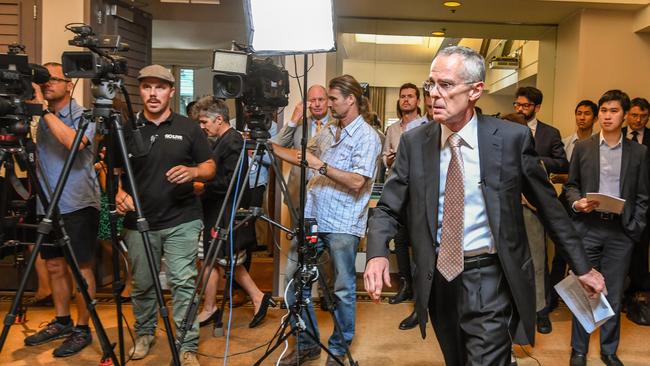Digital platforms: wide support for ACCC’s proposals to limit Google and Facebook dominance
Plans to rein in Facebook and Google have won wide support — including from the communications authority, which says there is an “urgent’ need for strict regulations over privacy.
Social
Don't miss out on the headlines from Social. Followed categories will be added to My News.
Plans to rein in Facebook and Google by preventing harm to individual privacy, advertisers and the media industry have won wide support — including from the communications authority, which says there is an “urgent’ need for strict regulations.
The call to action came in response to the preliminary findings of Australian Competition and Consumer Commission’s Digital Platforms Inquiry, which proposed a host of measures to increase protect users and limit the unchecked dominance of technology giants in Australia.
But some businesses expressed alarm at new privacy measures, saying they could create too much “red tape” for small businesses, while Google dismissed “regulatory oversight” as simply not necessary.

The consumer watchdog published 86 submissions to its Digital Platforms inquiry yesterday, including responses from individuals to law firms, charities to credit card companies.
The overwhelming majority of respondents supported the ACCC’s 11 preliminary recommendations, such as media regulations for digital platforms, timely ways to remove stolen content, and new rules for collecting personal information and dealing with “serious invasions of privacy”.
READ MORE: Facebook and Google ‘lock in’ small businesses, Inquiry hears
The Australian Communications and Media Authority said the Inquiry made “a clear case for bringing digital platforms into the regulatory framework” applying to other media organisations, as while they had begun as “innovative start-ups” the companies had “become global behemoths”.
“These platforms now have significant market power in Australia as a consequence of their dominance in digital advertising and media content, including news,” it said.
“The increasing influence and market power of digital platforms mean that regulatory reform is now urgent.”
Commercial Radio Australia also expressed concern there was “no regulatory means of holding such platforms to account” and argued they should be “independently monitored” to ensure they did not use their market power unfairly.

The regulatory proposals didn’t go far enough for FreeTV Australia, however, which said the ACCC’s proposals should “be strengthened” to require digital platforms invest in Australian content.
The Inquiry’s privacy recommendations proved more contentious, however.
Although new laws strengthening rules around collecting personal information were welcomed by the Australian Privacy Foundation and Australian Data Privacy Certification Register, they were criticised by the Fundraising Institute over concerns they could thwart efforts to “acquire new donors” and by the Australian Chamber of Commerce and Industry, which warned it could stop small businesses from moving online.
“There is a concern that the breadth of the proposals would create significant red tape for businesses designing websites,” its submission read. “Some small businesses may be put off and never pursue the benefits of the digital age.”
A major focus of the Inquiry, Google also responded to the ACCC’s recommendations at length in a 74-page document.
The American tech giant said the Inquiry had not found “the strongest, clearest evidence of harm to consumers,” and it rejected calls for new laws, copyright take-down standards, changes to default web browsers, and privacy measures.
“New regulatory oversight it not necessary for several reasons,” the company said.
The ACCC will subject final recommendations to the Federal Government by June 3.
Originally published as Digital platforms: wide support for ACCC’s proposals to limit Google and Facebook dominance


